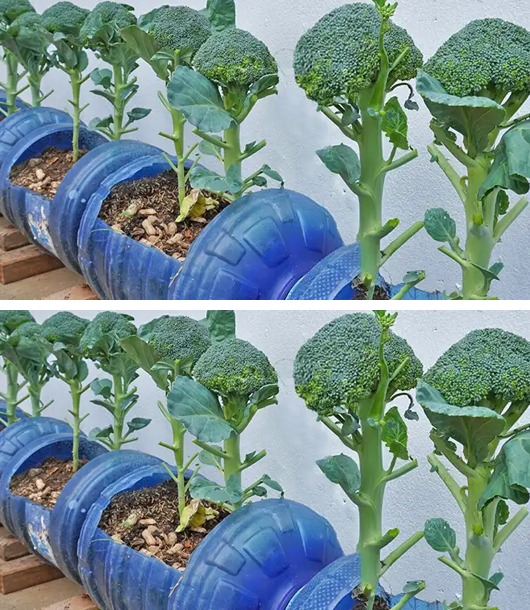ADVERTISEMENT
2. Plant the Seeds
- Plant broccoli seeds about ¼ inch deep and 2-3 inches apart.
- Cover lightly with soil and water gently.
- If using a large container, plant multiple seeds but ensure proper spacing between plants as they grow.
3. Provide the Right Light
- Place the container in a location that gets 6-8 hours of sunlight daily.
- If natural light is insufficient, use a grow light positioned about 6 inches above the plants. Adjust the height as the plants grow to maintain adequate light exposure.
4. Maintain Ideal Temperature
- Broccoli thrives in cooler conditions. Maintain an indoor temperature between 60-70°F (15-21°C).
- Avoid placing the container near heat sources or drafty windows.
5. Water Consistently
- Keep the soil evenly moist but not soggy. Check the soil by sticking a finger an inch deep; if it feels dry, it’s time to water.
- Ensure excess water drains from the container to prevent root rot.
6. Fertilize Regularly
- Feed your broccoli with a balanced liquid fertilizer every 2-3 weeks. Follow the package instructions for the right dilution.
- Organic options like fish emulsion or compost tea also work well.
7. Thin the Seedlings
- Once the seedlings are about 2-3 inches tall, thin them by snipping weaker plants at the soil line, leaving the strongest ones to grow.
- Maintain at least 18 inches of space between plants to allow room for growth.
8. Monitor for Growth and Pests
- Although growing indoors reduces pest risks, check the plants for any signs of fungus or insects.
- If you spot issues, use organic solutions like neem oil or homemade soap sprays.
9. Harvest at the Right Time
- Broccoli is ready to harvest when the central head is firm, tight, and about 4-6 inches in diameter. This typically occurs about 75-100 days after planting, depending on the variety.
- Use a sharp knife to cut the head off the plant, leaving a few inches of stem. Side shoots may continue to grow, providing a secondary harvest.
Tips for Success
- Rotate the Container: If using natural sunlight, rotate the container weekly to ensure even growth.
- Choose a Compact Variety: Smaller broccoli varieties are better suited for indoor growth.
- Mulch the Soil: Adding a thin layer of mulch helps retain moisture and regulates soil temperature.
- Prune Leaves: Remove yellowing or damaged leaves to direct energy to the developing head.
- Patience is Key: Broccoli takes time to mature, so monitor its growth and provide consistent care.
Conclusion: Fresh, Homegrown Broccoli Awaits
Growing broccoli indoors in a container is a rewarding experience that offers fresh, homegrown vegetables with minimal effort. By providing the right conditions and care, you can enjoy a continuous supply of nutritious broccoli straight from your windowsill.
Why not give it a try? Your journey to growing this delicious vegetable starts today!
ADVERTISEMENT
